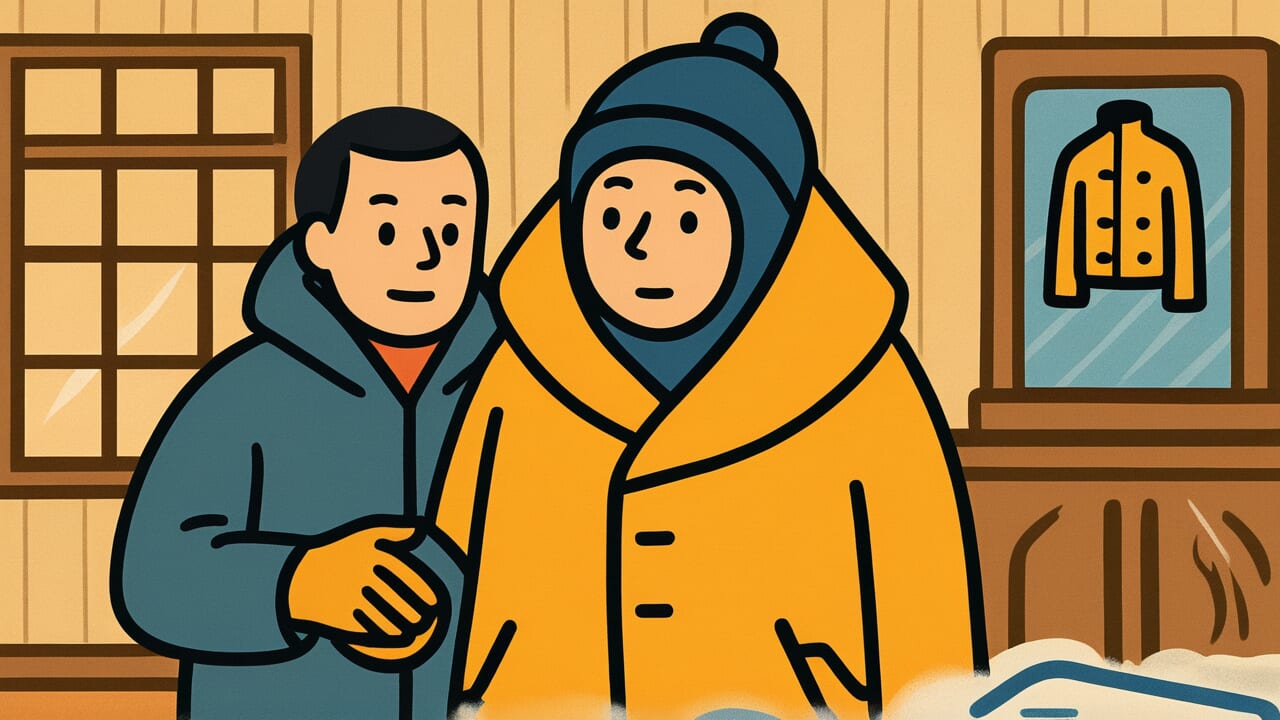How to Read “To one who is cold, even rough clothing is beneficial”
Samaetaru mono wa shuukatsu wo ri to su
Meaning of “To one who is cold, even rough clothing is beneficial”
This proverb means that poor people treasure even shabby clothing. For someone shivering in poverty, even worn-out rough clothing becomes an irreplaceable treasure that protects their body.
Something a wealthy person wouldn’t even look at can have immeasurable value to someone who truly needs it.
This proverb is used to show how the value of things changes depending on a person’s situation. It also conveys the nobility of being grateful for what you have, even in poverty, and treating it with care.
In modern times, we live in a society overflowing with things. We often lose sight of what truly matters. This saying reminds us that values are relative and depend on our position and circumstances.
Origin and Etymology
Clear written records about the origin of this proverb are limited. However, the components of the phrase reveal an interesting background.
“Samaetaru” means “to be cold” and represents poverty or hardship. “Shuukatsu” refers to short, rough garments made from coarse hemp or kudzu vine. These were simple clothes worn by poor people in ancient China and Japan.
“Ri to su” means “to consider beneficial” or “to value.”
This expression is thought to be influenced by classical Chinese philosophy. The idea that values change depending on circumstances has long existed in East Asian thought.
Rough clothing that wealthy people ignore becomes a precious treasure to someone shivering in the cold. This contrasting perspective is embedded in the proverb.
In Japan, similar expressions appear in Edo period moral instruction books. During that era of strict social classes, such sayings taught the importance of being content with one’s position.
As a teaching about gratitude for what you have even in poverty, it spread among common people.
Usage Examples
- Even with a small salary, to one who is cold, even rough clothing is beneficial – I have no choice but to keep wearing this old coat carefully
- I was really poor as a student, and to one who is cold, even rough clothing is beneficial – I can’t express how grateful I was for that one tattered jacket
Universal Wisdom
The universal wisdom this proverb shows is that value is not absolute. It changes greatly depending on a person’s situation. This is a fundamental truth of human society.
The same piece of clothing can be worthless garbage to one person but a life-saving treasure to another. This relativity is the underlying truth of human existence.
Why has this proverb been passed down for so long? It’s because humans are beings who constantly live through comparison.
We can’t help but compare ourselves to others and notice the difference between those who have and those who don’t. But this proverb isn’t just about the gap between rich and poor.
Rather, it teaches about true value that becomes visible only in hardship. It’s about the grateful heart we discover only when pressed by necessity.
When people are satisfied, they tend to lose sight of the true value of things. They don’t realize how precious the things they take for granted really are.
Only someone shivering in the cold can truly understand the preciousness of a single garment’s warmth. This insight applies not just to material wealth but to all blessings – relationships, health, and peace.
Our ancestors keenly understood this human trait: we only realize what’s important after we lose it.
When AI Hears This
For someone shivering in the cold, even rough cloth clothing has great value. When you quantify this, something surprising emerges.
Behavioral economics experiments show interesting results. If the joy of gaining the first item from nothing is 100, the second item drops to about 50, and the third to about 30.
In other words, the same piece of clothing has different psychological value. Going from zero to one versus going from ten to eleven – the former has more than three times the psychological value of the latter.
What’s more interesting is that the human brain responds not to absolute wealth but to the amount of change from the current position.
The happiness increase from raising income from 3 million to 4 million yen is greater than from 8 million to 9 million. The brain’s reward system works like a sensor detecting differences.
The lower the reference point, the stronger the response to the same improvement.
The essence of this proverb shows a mathematical fact: support for people in poverty is extremely efficient. Giving 10,000 yen to the wealthy barely changes their happiness.
But 10,000 yen to someone in poverty dramatically changes their life. The theoretical basis for modern redistribution policies was already intuitively understood in ancient China.
The sharp diminishing curve of marginal utility is the mathematical truth of human psychology that this proverb depicts.
Lessons for Today
This proverb teaches modern people not to judge things only by their own values. What seems trivial to you might be desperately needed by someone else.
Holding this perspective deepens your understanding of others. It enables more compassionate actions.
In modern society, things overflow everywhere. Getting new things constantly has become normal. But what truly matters isn’t what you have.
It’s how much you need what you have now and how grateful you can be for it. This proverb reminds us of the “appreciation” we tend to forget in our fulfilled lives.
It also cultivates imagination toward people in difficult situations. When you see someone carefully using old things, don’t look down on them.
Instead, respect the value those things have for that person. When positions change, values change too.
This flexible perspective is the wisdom most needed in modern society, where we must recognize diversity.



Comments